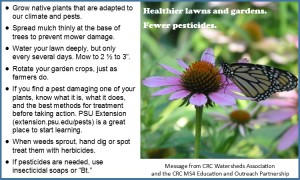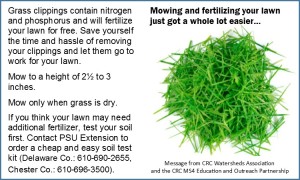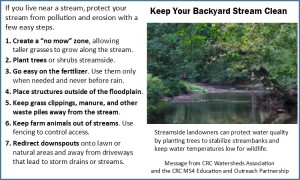Stormwater Management
 When it rains or snows, the water soaks in to the ground, evaporates back into the atmosphere or runs off. This runoff, also known as storm water, has some obvious impacts such as flooding and erosion. Some less obvious, but equally important, impacts of stormwater runoff include increased pollution, reduced ground water supplies, and lower stream flows during dry spells.
When it rains or snows, the water soaks in to the ground, evaporates back into the atmosphere or runs off. This runoff, also known as storm water, has some obvious impacts such as flooding and erosion. Some less obvious, but equally important, impacts of stormwater runoff include increased pollution, reduced ground water supplies, and lower stream flows during dry spells.
Traditionally, stormwater has been seen as a nuisance to be collected and dumped into the nearest ditch or stream and disposed of. Unfortunately, such an approach neglects the reality that most of us live or work downstream of someone else. As a result, our neighbor’s nuisance becomes our problem, which in turn becomes a problem for out downstream neighbors.
Changes in the way stormwater is to be handled will affect not only Nether Providence Township, but also, builders of new residential and commercial developments, renovators of existing storm sewers or waterways.
New stormwater regulations require Nether Providence Township to ensure that stormwater facilities are designed, constructed, maintained and operated properly. In addition the township must identify and eliminate the discharge of any materials other than rainfall, snowmelt or uncontaminated groundwater that may be discharged to the stormwater system.
Here are some of the most important ways for Township residents to prevent stormwater pollution:
- Properly dispose of hazardous substances, such as used motor oil, cleaning supplies and paint – never pour them down any part of the stormwater system, and report anyone who does.
- Use pesticides, fertilizers and herbicides properly and efficiently to prevent excess runoff of these items.
- Look for signs of soil and other pollutants, such as debris and chemicals, leaving construction sites in stormwater runoff or tracked into roads by construction vehicles. Report poorly managed construction sites that could impact stormwater runoff to the Township.
- Install innovative stormwater practices on residential properties, such as rain barrels or rain gardens, that capture stormwater and keep it on-site instead of letting it drain away into the storm sewer system.
- Report any discharge from stormwater outfalls during times of dry weather – a sign there could be a problem with the storm sewer system.
- Pick up after pets and dispose of their waste properly. No matter where pets make a mess – in a backyard or on open space – stormwater runoff can carry pet waste from the land to the storm sewer system to a stream.
- Store materials that could pollute water indoors and use containers for outdoor storage that do not rust or leak to eliminate exposure of materials to stormwater.
Stormwater Management Documents & Forms
A Homeowner’s Guide to Stormwater Management
Winter Deicing Tips for Residents
Rain Garden A Clean Solution for Stormwater Polution
Rain Gardens – A how-to manual for homeowners
For Cleaner Creeks, Save Fertilizer for the Fall
Cars for Cleaner Creeks, tips for stormwater management on your property
Stormwater Pollution and Yard Waste
Hold the Stormwater, Please! tips for stormwater management on your property
Keep Vehicle Washing from Harming Our Stream
What You Can Do About Washing Your Car
What the Construction Industry Should Know About Stormwater in Our Community
What You Can Do About Lawn Fertilization
What You Can Do About Your Car’s Leaking Oil
What You Can Do About Pet Waste
Stormwater Is Everybody’s Business
We All Live Downstream
– A Guide to Urban Stormwater Issues and Solution
Reducing Stormwater and Flooding
– The Ten Principals of Effective Stormwater Management
Clean Water Begins With You
– What is Stormwater Runoff and What You Can Do to Help
Links
Department of Environmental Protection (DEP) Home Page
Environmental Protection Agency
EPA Stormwater Program Overview
Chester Ridley Crum Watershed Association
Delaware County Conservation District Website
Chester County Conservation District Website
Chester County Water Resources Authority
EPS Public Education and Outreach on Stormwater Impacts
The DEP Southeast Regional Office website
Center for Watershed Protection
Nether Providence Citizen Water Quality Hotlines:
| DEP Water Quality Complaint Hotline Daytime | 484-250-5991 | Weekdays 8:30 AM to 4:30 PM |
| DEP 24 Hour Water Quality Hotline | 484-250-5900 | Anytime, including evenings and weekends |
| Off site discharge of sediment, erosion, & other improper controls during construction. | Delaware Co. Conservation District 810-892-9784, or Chester County Conservation District 610-925-4920 | Send photo, full address, and directions |
| Clogged or leaking sanitary sewer lines; sewage smell in creek | Nether Providence Twp 610-566-4516 |
Weekdays 9:00 AM to 5:00 PM After hours call 911 |
| Fish Kills, Illegal Fishing | PA Fish Commission 717-626-0228 |
Also call DEP Water Quality 484-250-5900 |
| Broken water mains | Chester Water Authority | 610-876-8181 – 24 hour |
| Broken water mains | Aqua Pennsylvania | 610-525-1402 – 24 hours |


